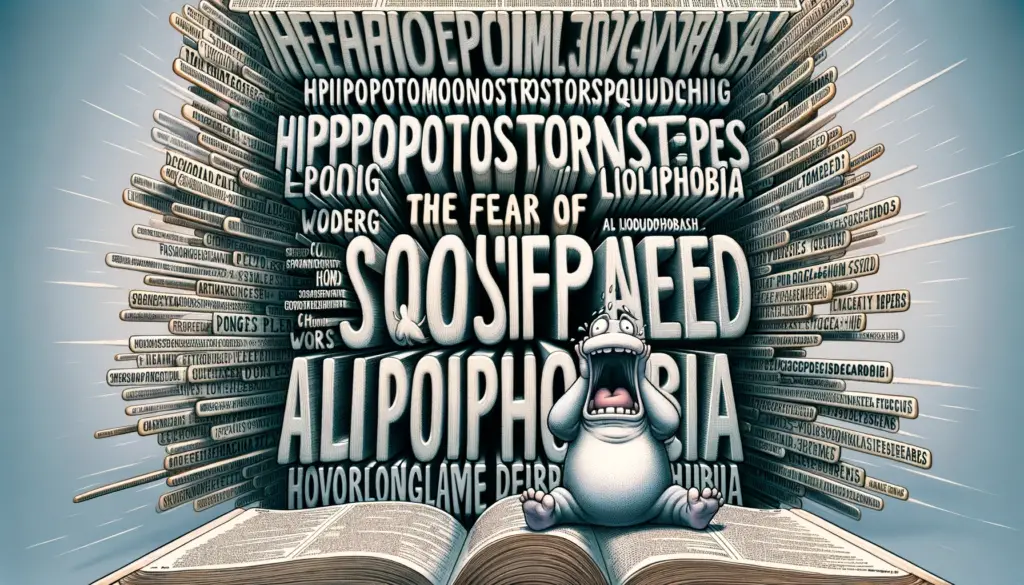Hippopotomonstrosesquippedaliophobia or the Fear of Long Words

Have you ever felt your heart sink like a stone when faced with a long, unfamiliar word? If so, you may be struggling with hippopotomonstrosesquippedaliophobia, the fear of long words.
This condition can cause significant distress, leaving you feeling overwhelmed and anxious. With the right help and support, however, you can overcome this fear and lead a healthy and fulfilling life.
In this article, you will learn about the symptoms, diagnosis, causes, treatments, and more.
Key Takeaways
- Hippopotomonstrosesquippedaliophobia is a fear and anxiety triggered by seeing long words, and individuals may avoid reading to prevent encountering long words.
- The fear of mispronouncing long words and the associated embarrassment or fear of ridicule can cause distress and anxiety for individuals with hippopotomonstrosesquippedaliophobia.
- The causes of hippopotomonstrosesquippedaliophobia can include genetics, learned behavior from negative experiences, traumatic events related to long words, and changes in brain activity.
- Diagnosis and treatment options for hippopotomonstrosesquippedaliophobia include evaluation of symptoms and medical history, exposure therapy, cognitive-behavioral therapy (CBT), medications, talk therapy, mindfulness strategies, and lifestyle changes.
Symptoms and Causes
You may experience anxiety, distress, and fear when encountering long words if you suffer from hippopotomonstrosesquippedaliophobia. Common symptoms of this phobia include avoidance of reading, embarrassment, fear of being mocked when pronouncing words, and distress caused by mispronouncing words.
Hippopotomonstrosesquippedaliophobia is an anxiety disorder and may be triggered by a traumatic experience, genetics, or learned behavior. Brain activity can also be a factor.
Treatment may include exposure therapy, CBT, medications, talk therapy, and lifestyle changes. It’s important to seek help from a mental health professional to manage symptoms of the phobia and to help lead to a better quality of life.
Diagnosis and Treatment

Diagnosing hippopotomonstrosesquippedaliophobia can be difficult due to avoidance of situations involving long words.
Treatment options include:
1) Exposure therapy to help change the response to fear-inducing words.
2) Cognitive Behavioral Therapy (CBT) to manage anxiety and intrusive thoughts.
3) Medications to manage anxiety disorders, though their effectiveness for this phobia isn’t well known.
Talk therapy, mindfulness strategies, and support groups are additional treatment options.
Coping skills such as lifestyle changes such as getting enough sleep, maintaining a healthy diet, and avoiding anxiety-inducing substances can also be beneficial in managing social phobia.
Online Therapy Options
In addition to working with a trained therapist, individuals with hippopotomonstrosesquippedaliophobia may also find relief through online therapy options. These include virtual reality therapy, talk therapy, and exposure therapy.
By rationalizing their fear and attempting to lessen it, individuals can become more accepting of long words.
When exploring online therapy options, it’s important to accept all essential cookies and reject non-essential ones. This will ensure that the therapy sessions are secure and confidential.
It’s also important to ensure that the therapy provider is licensed and experienced in treating phobias. With the right help, individuals can learn to manage their symptoms and live a fulfilling life.
General Information
Fifty-five percent of adults in the United States experience some type of phobia, according to the National Institute of Mental Health.
Hippopotomonstrosesquippedaliophobia, or fear of long words, is one of the most common phobias. It’s characterized by feelings of fear, anxiety, and embarrassment when reading or pronouncing long words. The term ‘hippopotomonstrosesquippedaliophobia’ was created for literary effect and is one of the longest words in the dictionary, containing 36 letters. The length of the word reflects the fear it represents.
Those with this phobia may experience rapid heartbeat, shortness of breath, and a strong desire to escape the situation.
Treatment options include:
- Cognitive-behavioral therapy (CBT).
- Exposure therapy.
- Virtual reality therapy.
- Medications.
Avoidance behaviors are common in those with hippopotomonstrosesquippedaliophobia, so it’s important to seek professional help. Working with a trained therapist can help individuals learn to manage their symptoms and cope with the fear of long words.
Other Phobias and Anxiety Disorders
Besides Hippopotomonstrosesquippedaliophobia, other phobias and anxiety disorders can include haphephobia (fear of touch), abandonment issues, and pantophobia (fear of everything).
Overcoming these fears often requires professional help and may include creating a treatment plan that involves cognitive-behavioral therapy, exposure therapy, and in some cases, medication.
Risk factors for developing these disorders can include genetics, traumatic experiences, and learned behavior.
It’s important to seek help if you’re experiencing any of these phobias as it can be difficult to overcome them on your own.
With the right treatment plan and professional help, you can learn to manage your symptoms and experience a healthier and more fulfilling life.
Definition, Origin, and Length
Your fear of long words, Hippopotomonstrosesquippedaliophobia, is rooted in the Latin phrase ‘sesquipedalia verba’, which means ‘words a foot and a half long’. The term ‘hippopotomonstrosesquippedaliophobia’ was coined by the American poet Aimee Nezhukumatathil in 2000 and is one of the longest words in the dictionary, containing 36 letters.
It reflects the fear of long words, such as sesquipedalian and titin. The length of the word adds to the uniqueness and complexity of the condition. Though amusing, it isn’t a genuine medical condition, but rather a linguistic curiosity.
Understanding different phobias can help raise awareness and promote empathy.
Relationship to Aibohphobia
You may also find similarities between hippopotomonstrosesquippedaliophobia and aibohphobia, which is the fear of palindromes. Aibohphobia is also a wordplay and isn’t a specific phobia recognized by the American Psychiatric Association in its Diagnostic and Statistical Manual.
The longer versions of these words were likely created for humorous effect, and their length is reflective of the fear they represent. Those with hippopotomonstrosesquippedaliophobia may also struggle to cope with palindromes due to their length and complexity.
However, it’s important to note that neither of these are genuine medical conditions, and the use of the ‘-phobia’ suffix doesn’t make them any more valid.
Not a Genuine Medical Condition
Hippopotomonstrosesquippedaliophobia isn’t recognized as a genuine medical condition. It’s ironic that this phobia isn’t taken seriously, since it can be as debilitating as any other phobia, such as arachnophobia. When faced with a long word, individuals with this phobia are unable to control their fear and anxiety. This learned behavior is similar to that seen in social anxiety disorder.
Here are three key points to remember about hippopotomonstrosesquippedaliophobia:
- It isn’t an officially recognized condition.
- It’s as serious as other phobias.
- It’s a learned behavior.
Despite the lack of recognition, it’s important to seek professional help if this phobia is causing significant distress and impairment. A mental health professional can provide resources and tools to manage the symptoms and help individuals learn to cope with their fear.
Frequently Asked Questions
How Can I Tell if I Have Hippopotomonstrosesquippedaliophobia?
If you find yourself feeling anxious or overwhelmed when pronouncing or reading long words, or experience difficulty learning them, you may have hippopotomonstrosesquippedaliophobia. Speak to a doctor to confirm a diagnosis and discuss treatment options.
Are There Any Medications That Can Help Me Manage Hippopotomonstrosesquippedaliophobia?
Are you struggling with a fear of long words? Well, you’re not alone! A metaphor can help: it’s like being stuck in a dark tunnel, but with medication, you can find a way out. Medication can help reduce anxiety and manage symptoms, so talk to your doctor about what’s best for you.
Are There Any Lifestyle Changes I Can Make to Help Reduce My Fear of Long Words?
Yes, making lifestyle changes can help reduce your fear of long words. Try getting enough sleep, eating a healthy diet, and avoiding anxiety-inducing substances. Additionally, consider trying cognitive-behavioral therapy, exposure therapy, and talk therapy.
What Other Phobias Are Similar to Hippopotomonstrosesquippedaliophobia?
Other phobias similar to hippopotomonstrosesquippedaliophobia include arachnophobia (fear of spiders), thalassophobia (fear of the sea), haphephobia (fear of touch), abandonment issues as an anxiety disorder, pantophobia (fear of everything), and bibliophobia (fear of books). Understanding these phobias can help you manage your fear.
Is Hippopotomonstrosesquippedaliophobia a Real Medical Condition?
No, hippopotomonstrosesquippedaliophobia is not a real medical condition. It is more of a linguistic curiosity than a genuine phobia. Despite its 36 letters, the word is not officially recognized due to the lack of significant distress and impairment associated with the fear. Interestingly, the longer version of the word was likely created for literary effect.
Conclusion
It’s ok to be intimidated by long words – you’re not alone! With the right support and treatment, you can overcome hippopotomonstrosesquippedaliophobia and lead a healthy and fulfilling life.
Don’t let this fear hold you back – take control and start living your life to the fullest! You’ll be surprised by how much you can do and how far you can go once you’ve conquered this fear.
It won’t be easy, but it will be worth it. So take a deep breath and just go for it!






